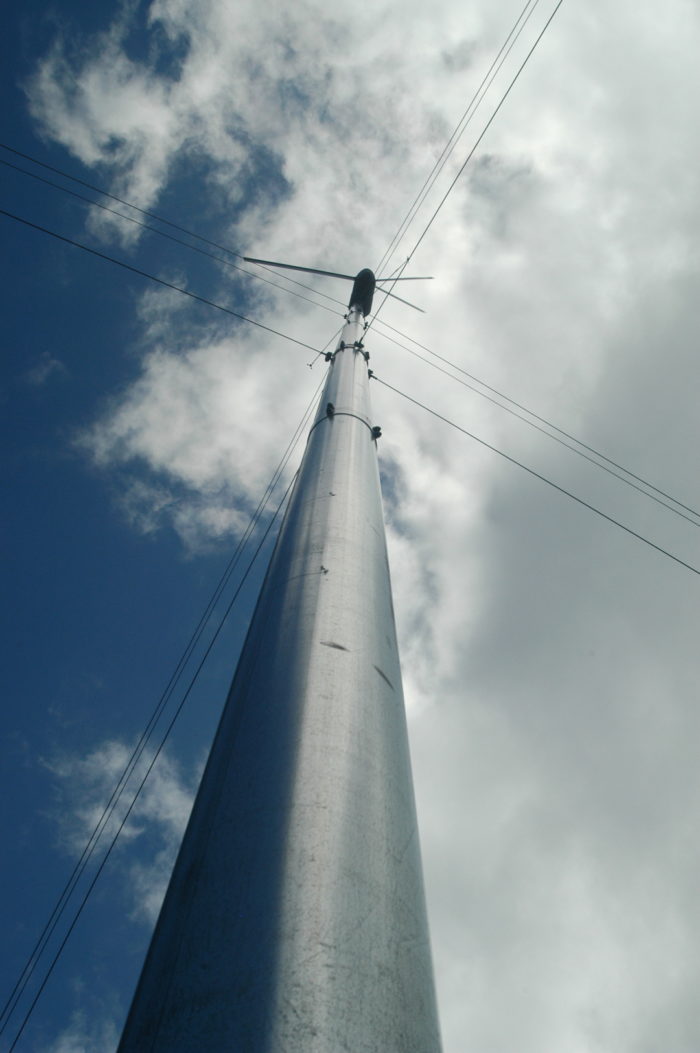
Small-scale renewable energy
Individual actions to reduce global carbon emissions include the installation of a small wind generator or photovoltaic panels. But do steps like these actually get us anywhere?Image Credit: Scott Gibson
For GBA senior editor Martin Holladay, it all started with a column in The New York Times provocatively titled “Going Green But Getting Nowhere.”
The author, Gernot Wagner, contends that individuals can make no meaningful impact on reducing carbon emissions and staving off global climate change.
Even if each of the 1 billion Catholics on Earth decreased their emissions to zero overnight, Wagner writes, “the planet would surely notice but pollution would still be rising.”
“So why bother recycling or riding your bike to the store? Because we all want to do something, anything,” Wagner adds. “Call it ‘action bias.’ But, sadly, individual action does not work. It distracts us from the need for collective action, and it doesn’t add up to enough. Self-interest, not self-sacrifice, is what induces noticeable change. Only the right economic policies will enable us as individuals to be guided by self-interest and still do the right thing for the planet.”
And by that, he means a cap-and-trade approach put into place by government.
Holladay (who has lived off the grid for many years) doesn’t agree. “My own opinion differs from Wagner’s,” he writes in a post at GreenBuildingAdvisor. “I’m a firm believer in the importance of personal actions that are consistent with our goals — but I agree that without governmental action, we face a grim future indeed.
“I also disagree with the author’s belief that living off the grid is a form of purgatory,” Holladay adds. “Really, Gernot, it’s not so bad.”
So what’s it going to be? Personal action or government policy? That’s the subject of this week’s Q&A Spotlight.
Weekly Newsletter
Get building science and energy efficiency advice, plus special offers, in your inbox.

This article is only available to GBA Prime Members
Sign up for a free trial and get instant access to this article as well as GBA’s complete library of premium articles and construction details.
Start Free TrialAlready a member? Log in















6 Comments
Great Job
Summarizing that discussion must have been like trying to herd cats, Scott. Your version is so well done I hope you'll find a way to get it to a much wider audience.
thanks.
Peter Yost mentions the
Peter Yost mentions the obvious that was my point as one of the "cats" ..... though "self-reorganizing" is, was and will always be nature, life, the universe, us.
Some fun reading.... Start reading the works of Fritjof Capra. A partial quote follows from Wikipedia.
"Capra pushes for western society to abandon conventional linear thought and the mechanistic views of Descartes. Critiquing the reductionistic Cartesian view that everything can be studied in parts to understand the whole, Capra encourages his readers to take a holistic approach. In The Web of Life, Capra focuses on the systemic information generated by the relationships among all the parts as a significant additional factor in the character of the whole, emphasizing the web-like structure of all systems and thus the interconnectedness of all parts.
Capra is purportedly setting the grounds for change in many new
theories [citation needed] , one of which is the living systems theory, a theoretical framework for ecology. This theory is only now fully emerging but it has its roots in several scientific fields that were developed during the first half of the twentieth century —organismic biology, gestalt psychology, ecology, general systems theory, and cybernetics.
Fritjof Capra is a founding director of the Center for Ecoliteracy located in Berkeley, California, which promotes ecology and systems thinking in primary and secondary education."
Individual action might spur collective action
A couple things...
Especially in the absence of collective action, individual action seems all we've got. While it may be a drop in the bucket, or even "worthless" in the grand scheme of things, I don't think one should overlook how individual actions can start to change the conversation, foster new norms, and facilitate collective action.
I put solar on my house last year and did an insulation retrofit. It will not solve global warming. But my "sphere of influence" has gotten an earful from me about how well it's worked, and has learned something about renewable energy via osmosis. We've had talks about energy, conservation, renewable generation, and climate change. It has furthered the conversation. Some people I know are considering doing the same, and more than one has probably taken a look at their electric bills with a more critical eye. When it comes to politics, they might be slightly more likely to support a candidate who is more willing to try to tackle this.
I suppose the only drawback to individual action is if it is too cost-intensive - if that residential solar PV rebate took money which could have been used more efficiently elsewhere, but I don't know if that can be judged too well at this point.
Sometimes I do think it's too late, but I don't know for sure. Have we driven off a cliff, foot still on the accelerator, or is there still some chance that stopping the inputs will increase chances of a better outcome? Maybe nothing we do will change the trajectory we've set, but it still makes sense to me to stop actively pushing in the wrong direction. Maybe it'll buy some time, or affect the outcome in some small way. It's all I know to do...
Eric
Nice post...
Great blogs regarding "Green"
Brian Savage summaized best:
Group: BUILDER
Discussion:Is "green" construction worth the trouble?
If the dual flush toilets work better... great, that is exactly my point. Things should be sold based on their real value, not on a fictional value. I also understand the fact that there are occasional, local water shortages... but, you have to admit; "occasional and local" is not the environmentalist's focus. They are more into "devastating and global" (which doesn't exist). I have not seen any reliable data on why driving a V8 is worse than driving a 4-cylinder or why, other than functionality; using a dual-flush toilet is better than using a 1974 toilet that sucks up as much water as possible... water doesn't cease to exist when you flush the toilet... it goes back into the water table. It does this because of gravity, which man has no power to control.
Please don't get me wrong Trish. I totally understand where you are coming from. If you want to buy dual flush toilets and solar panels and Smart Cars... that's fine, this is a free country after all. In fact, that's great, folks like you are making the market for such products and, if they are to sell, a market must be made. I just object to the WAY it's being sold. There is no long-term, global environmental crisis to justify a politically induced green movement. There is no long-term, global environmental crisis.... period.
A third of Europe died in the 1340's and '50's because the streets were open sewers... THAT is an environmental disaster. Carbon dioxide emissions and water usage are not. Keep in mind that 70% of the planet is covered with water and that water transpires more CO2 than we could ever hope to produce by anthropogenic means. So, driving your V8 and flushing your 1974 toilet is not destroying the environment. It might be burning a hole in your wallet; but it's definitely NOT destroying the environment.
BTW, that article is 100% speculation. I especially like the part about California's water shortages. Of course California has water shortages... they have EVERYTHING shortages because they are trying to control it all centrally! That never works! Besides, what was the excuse in the 1930's when we had the great dust bowl? That couldn't have been global warming because global warming didn't start until after the tragedy which was global cooling, which occurred in the 1970's. Global cooling, by the way, was also nonsense... as was the "holes in the ozone" scare we experienced in the '80's in which we replaced the much more efficient CFC's and HCFC's we were all used to using with less efficient refrigerants.
While I'm at it... I think we should bring back DDT. It is much less devastating than the millions of annual deaths caused by malaria every year in Africa and South America. Who are we to say they can't get rid of their malaria problem the same way we did? Yes, North America had a malaria problem too... until we dealt with it. Guess how we did it? You got it... DDT! Now we (via the UN) have the audacity to tell other countries that they have to just suffer the deaths of millions of their citizens because we have deemed DDT to be a toxin.
Do you see how many problems this environmentalist movement has caused?
People should let people be free!!!
Posted by Brian Savage
Savage nation
Genius! Pollution is a myth. Anarchy is the answer! We only need a govt to protect corporations from the people. Profit is god. Amen
Log in or become a member to post a comment.
Sign up Log in